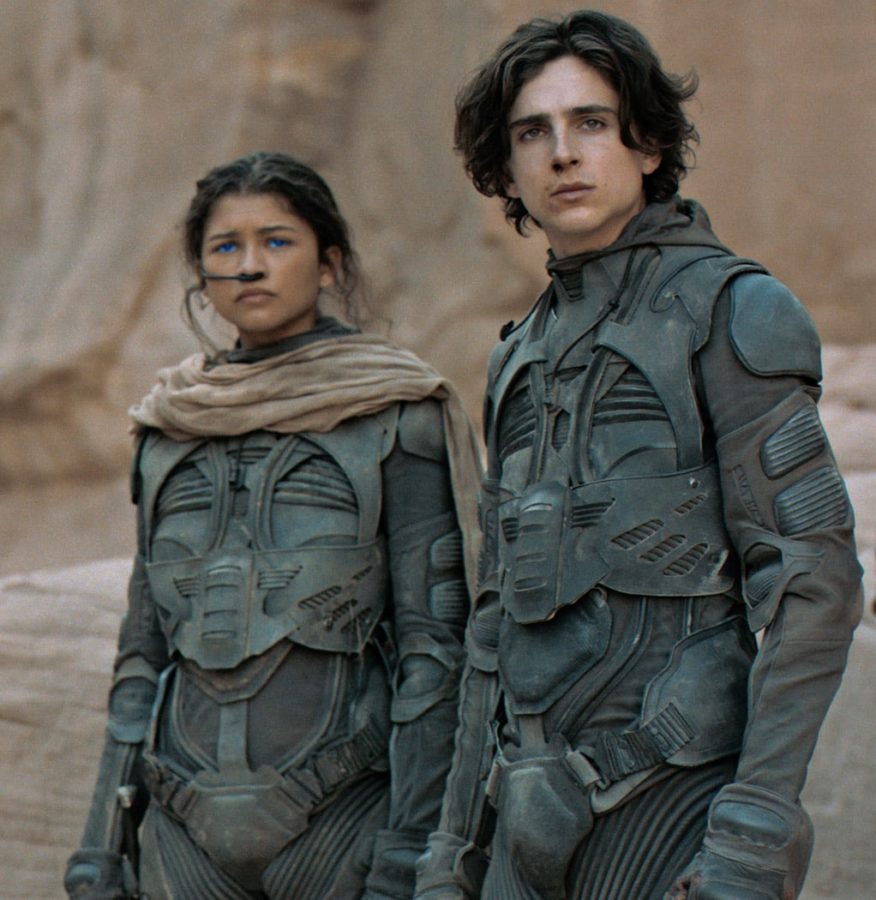“Dune” is a dub
Though incomplete, the sci-fi thriller is stunning and immersive, saturated in social commentary
Watching “Dune” is comparable to trekking through the parched desert to reach a blissful first sip of fresh water—what couldn’t truthfully be called an enjoyable journey, but so worth it in the end.
Denis Villeneuve’s 2021 film adaptation of “Dune,” Frank Herbert’s classic sci-fi novel, is the second time the story has hit the silver screens, this time featuring a star-studded cast most notably with Timothée Chalamet and Zendaya. Much like the giant sandworms that slither underneath the sandy exterior of the planet Arrakis—the film’s primary setting—betrayal, romance and allegory lie right beneath the surface.
The vast expanse of “Dune” reaches beyond merely a sci-fi flick; the novel was originally inspired by the Middle Eastern issues of the mid-1960s with oil. Protagonist Paul Atreides (Timothée Chalamet) is set to inherit control of Arrakis when the galaxy’s emperor replaces the rival family, the Harkonnens, with the Atreides line to rule the planet. Arrakis possesses great quantities of “the spice,” a metaphor for oil, that outsiders move in to harvest with no regard for the native peoples living there, known as the Fremen.
Herbert’s original novel obscures the perspective of the Fremen, the injustice of having foreign colonizers treat sacred land as nothing more than a profit potential. Villeneuve subverts this in the film, having Chani (Zendaya), a Fremen woman who becomes Paul’s romantic interest, narrate the opening scene: “My planet Arrakis is so beautiful when the sun is low […] They ravage our lands in front of our eyes. Their cruelty to our people is more than I can stand.” Though Paul and his father, Duke Leto, are somewhat painted as the “good colonizers,” Chani wonders, “Who will our next oppressors be?” reminding the audience of the reality of Paul’s presence on Arrakis.
This increased focus on the indigenous perspective provided a pertinent, valuable dimension that was lacking in the book. This new angle wasn’t the only socially aware change Villeneuve made; Dr. Liet Kynes (Sharon Duncan-Brewster), Arrakis’s planetologist, was a male character in the book but was cast as a woman for the 2021 film. Like a lot of older sci-fi media, the original text and earlier adaptations of “Dune” suffer from a lack of substantial female characters, setting aside Paul’s mother who is part of the Bene Gesserit, an ultra-powerful witchy sisterhood with social, religious and political power. Making Kynes a woman made the story more appropriate for the social climate of today.
On the other hand, Chani, who is essentially nothing more than Paul’s concubine, was not given the same attention—rather, she was given almost no attention. With Zendaya’s name highlighted in advertising and used to garner excitement, it would seem reasonable to expect her to play a main role. Quite the contrary proved true, for Chani only appeared sporadically after her opening monologue for slow motion shots in Paul’s visions and then briefly at the end. While part two of the series — as the 2021 film “Dune” only covers the first half of the book — will surely bring her role more into the center, it is disappointing that the hype wasn’t delivered upon.
For Paul’s character, the film did the opposite: Chalamet’s portrayal of Paul made connecting with the character a breeze, uncommon in the still air of the Arrakian deserts. In the book, Paul felt like a distant figure. In the film, Paul was a sympathetic teenage boy forced into power and leadership too early by fate and internal merit. By honestly displaying Paul’s humanity — fears and strengths alike — Chalamet transformed Paul into a character the audience doesn’t only want to root for, but a character the audience has no choice but to root for.
Not only did Chalamet’s performance draw attention, but the pure immersiveness of “Dune” demands applause. With sweeping, stunning and spectacular visuals and landscapes paired with a killer score, the film pulls the audience in and then holds onto them like quicksand. The costuming was also a highlight, augmenting the realism that unexplainably coexisted in harmony with the surrealism of Arrakis’s alien world.
All that being said, the plot itself is simply not that enthralling, particularly the first half. After trekking for two and a half hours through a dry worldbuilding and plot set-up, just when the action is kicking in and the character development is beginning, the film ends. To be continued.
Undeniably, epic production requires great depth, and Villeneuve even told “Vanity Fair” that he would not agree to make a single film adaptation because the world “takes its power in detail,” but the pacing felt way off.
Even though at times it drags on, “Dune” is a stunning work of film that faithfully retains the best qualities of the book and spins the source material to be more fitting to today’s world. Fans of Chalamet’s past work will be once again impressed, and original readers of the novel will not be disappointed. Though Arrakis is dry as bone, this film is soaked and saturated with political intrigue, struggle and symbolism.

My initials may be eh, but my stories sure aren't! I'll love you forever if you peel me a tangerine.




Anonymous • Jan 6, 2022 at 1:49 pm
ELISE IM YOUR NUMBER ONE FAN!!!